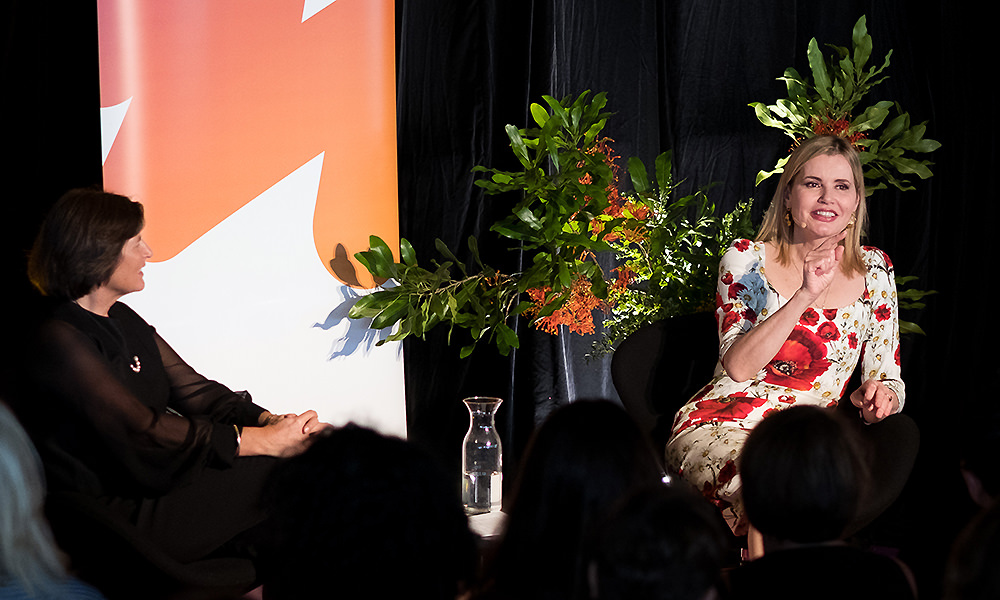How to make more money in TV & film
Geena Davis has a pretty straightforward answer for how to make more money in film and television – and you’ll be doing the world a service too.
 Sue Maslin and Geena Davis/Ben Symons
Sue Maslin and Geena Davis/Ben Symons
Geena’s advice? Include more women.
The Geena Davis Institute on Gender in Media found that in the top 100 grossing non-animated films of 2015 (as reported by Variety), those with female leads made 15.8% more money at the box office than the ones starring male leads.
And it’s even better when they’re working together. Films with male and female co-leads earned 23.5% more on average than films with male or female leads alone.
However, despite on average making more at the box office, female-led films made up only 17% of the films found in that list.
Academy-Award® winning actor and advocate Geena Davis, who founded the Institute, addressed a gathering of the Australian screen industry on Sunday 5 March at an event co-presented by Screen Australia and the Sydney Opera House.
But it wasn’t all doom and gloom. Information is empowering, as Davis has found.
“Data is everything. It was impossible to convince anyone before the data and now they are utterly convinced,” she said.
In the decade since the Geena Davis Institute was launched, they have been taking their research to studios and creators of children’s entertainment. And Davis feels like it’s starting to have an impact.
“I really feel like even in five or ten years we might see some dramatic change in the number and quality of female characters.”
Davis had three key messages for the Australian industry to take away:
1. We all have unconscious gender bias
“We need to realise that none of us escaped having unconscious gender bias. Whether you’re a woman or a man, we all have it,” Davis said.
“I know that in my life I felt very much – and not even like this was a bad thing or that I was forced to – that I have to be nice, everyone has to like me…
“We all have unconscious gender bias that we have to actively overcome… You might think you’re just choosing on merit, but you’re not because it’s so hard to conquer… so figure out a way to make it (female representation) half.”
2. It starts in children’s TV and film
“When my daughter was a toddler and I started watching little kids stuff with her I immediately noticed… that there seemed to be profoundly more male characters than female characters,” Davis said.
“We’re training kids from the beginning to have unconscious gender bias.
They’re taking in this world that’s nearly bereft of female presence and boys and girls are getting the message oh I see, girls are not that important."
“We all are very invested in fixing the problem of unconscious gender bias… yet we’re still creating it so my thought was why create a problem that we have to try and fix later? Why don’t we just stop doing that?”
When Davis first tried to tell people about the problem in children’s programming, they insisted it used to be a problem, but not anymore.
“So that’s when I decided, I want to get the data.”
She did, and ever since has been conducting further research to share with studios and creators.
“And they are horrified… some people had their head in their hands when they heard it. Because people that make kids entertainment are usually doing it because they love kids…
“Very often our work is done right on the spot. I think we’ve yet to leave any meeting where somebody hasn’t said, ‘you’ve just changed my project’ and sometimes the company will say, ‘we’re going to look at all of our projects’.”
3. Companies and people should set themselves personal quotas
“Onscreen, my feeling is we can’t talk anything remotely like quotas. It’s artistic, it’s somebody’s vision. My message is, have you thought about making that character female? Not: this is what you absolutely should do and every movie should be absolutely the same, all 50%.
“However, behind the camera, I think it’s totally different. (Quotas) can’t be imposed I don’t think, but people can make decisions on their own to establish a sort of quota. Like Ryan Murphy (showrunner, American Horror Story) is doing. He’s launched an institute called Half and the whole goal is to get half of the crew behind the camera… to be female.
“I think it is going to take people making decisions like that.”

What to read next
We check in with some of the recipients of Gender Matters to see how their projects or initiatives have been progressing.
08 Mar 2017
Caris Bizzaca